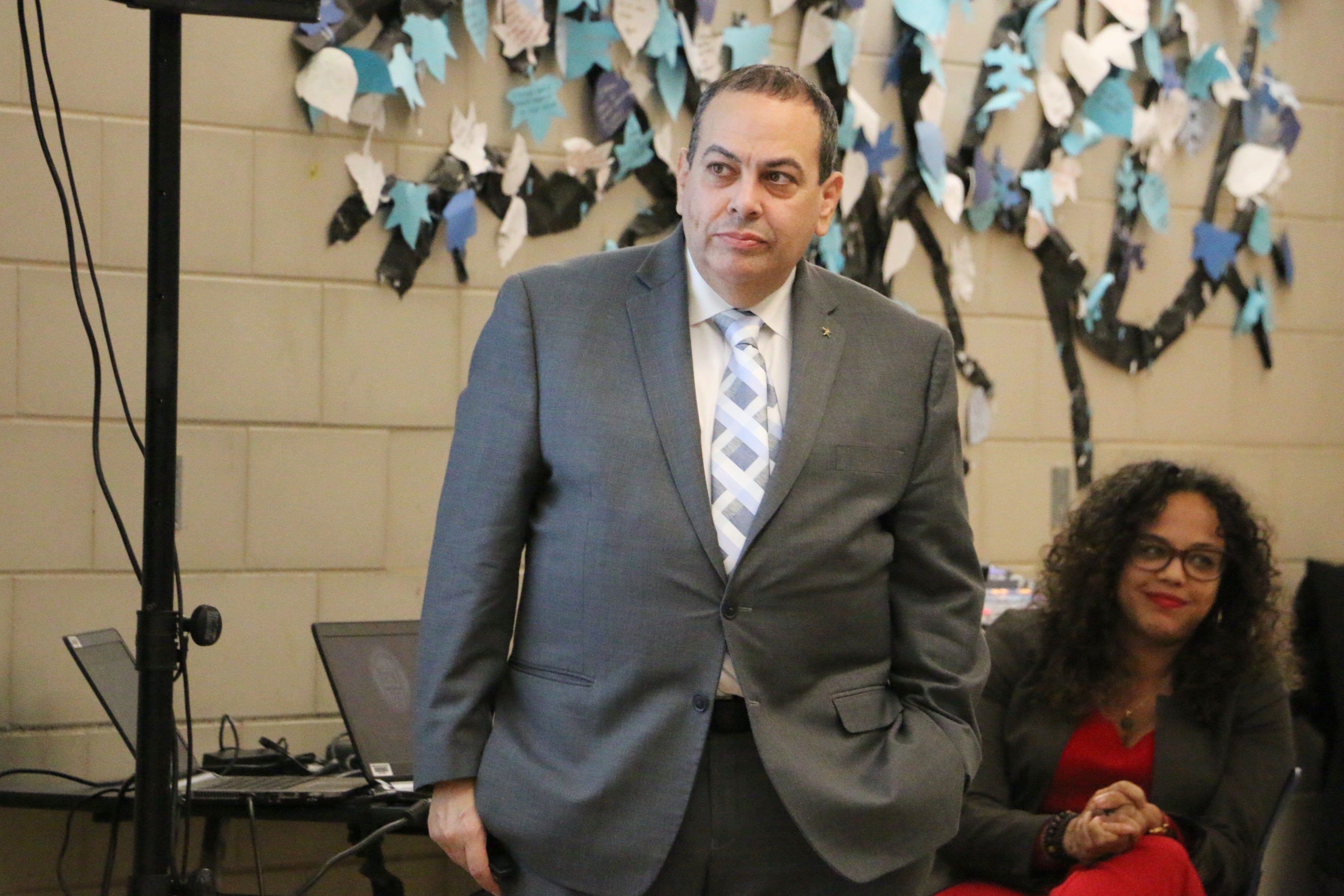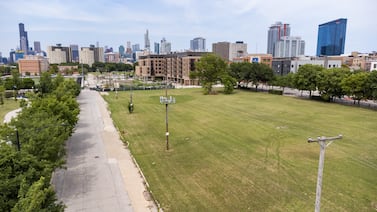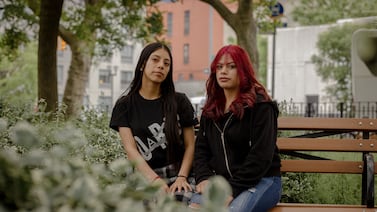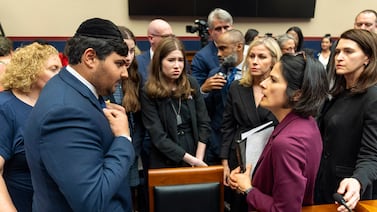Sign up for Chalkbeat Newark’s free newsletter to keep up with the city’s public school system.
Newark school officials’ removal of a teen book about a 12-year-old Palestinian boy from its curriculum spurred a public outcry at a recent school board meeting. Moments later, the board axed the superintendent’s power to make decisions on controversial reading materials.
A school board spokeswoman says the policy change is unrelated to the book removal, which drew dozens of community members to a board meeting last week. Educators and parents, outraged over the district pulling the book from the sixth grade curriculum, said the decision evokes book bans, which have been on the rise in recent years amid culture wars and campaigns for censorship over social justice issues.
After an hour and a half of public comments that at times became fiery, the nine-member Newark school board, which had just appointed two new members, voted to update its policy on books and other classroom materials that receive complaints from the public.
The policy originally assigned the superintendent to make final decisions on what happens to those materials that are challenged, but, with the amendment, that power transferred to the school board. Deering said the amendment came as a recommendation from the state School Boards Association.
Though the board says it’s unrelated, the policy change occurred as controversy brews over the fictional book, “A Little Piece of Ground” by Elizabeth Laird, and how or why it was removed from the curriculum.
The book, about a 12-year-old Palestinian boy navigating his life in the Palestinian city of Ramallah, with war and conflict at the center of his struggles, was in sixth grade classrooms across the district beginning the fall of 2022, district spokeswoman Nancy Deering confirmed in an email.
In the summer of 2023, district school officials removed the novel, which was first published in 2003.
Educators and parents who spoke at the Jan. 25 meeting questioned why the book was removed from the sixth grade curriculum. They talked about its importance and relevance for students trying to understand the Israel-Hamas war and the violence in Israel and the Gaza Strip, even though the removal occurred before the war began on Oct. 7.
They also questioned whether the district had been influenced by outside organizations to remove the book. A recent announcement from the Jewish Federation of Greater MetroWest NJ, a nonprofit organization and the local arm of a larger national group, spurred community members to go to Thursday’s meeting and demand answers from the board.
The Jewish nonprofit says it lobbied Newark Public Schools officials, including board members, and city and state officials, for a year to get the book off Newark’s classroom shelves.
“It is a rare event for us to weigh in on curriculum issues, much less try to get a book removed from classroom study,” said Dov Ben-Shimon, the organization’s CEO, in a statement last month. “But the stakes were too high for us to ignore this one.”
Ben-Shimon also said in that statement that his team tried to meet with “educators and civic leaders” but “were often met with closed doors, unreturned phone calls and outright hostility.” But, he added, “lay leaders and major donors who had deep connections within the City of Newark” supported their efforts “ultimately leading to a successful outcome.”
Still, Superintendent Roger León said, the district did not “ban” the book, but rather it was removed as part of a curriculum update.
“No student or staff member has been forbidden from reading any material or any literature,” León said.
Some school board members said they were concerned that the book was removed from the curriculum without their knowledge and disappointed that they were not consulted before the decision was made.
“It is a disservice to our community. It is a disservice to the Muslim community. It is a disservice to the sixth grade parents. And it is a disservice to anybody who had to take their time with 53 speakers to come and talk about a book ban that we did not authorize,” Board Co-Vice President Dawn Haynes said at the meeting, which was held at Newark Vocational High School.
Haynes said the decision to remove the book was not reflected in meeting minutes over the last year for the program and instruction committee, which oversees curriculum decisions in the district.
Newark Mayor Ras Baraka’s press secretary Susan Garofalo said the Baraka administration is “unaware of any meetings” held with the Jewish Federation and city officials about the removal of the book.
“Mayor Baraka has not read the book in question to determine the veracity of claims that it is anti-Semitic,” Garofalo said. “However, as a general principle, the mayor’s stance is against banning books.”
The Jewish Federation of Greater MetroWest NJ declined to comment.
Threat of book bans spark policy changes
In the fall, the Essex County school board association passed legislation on county book bans called the Protect the Freedom to Read act. The resolution addresses the book bans popping up around the county at local school boards and aims to protect academic freedom, the board said.
Last month, the Jewish Federation of Greater MetroWest NJ issued a statement that outlined its efforts to ban “A Little Piece of Ground” in the Newark Public Schools and its recent success in that effort.
“After over a year of intense lobbying efforts on the part of our Jewish Community Relations Council, I’m pleased to let you know that a deeply troubling and prejudicial book which had been assigned to sixth graders in the Newark Public School system for the last year, has just been pulled from 200 classrooms across the city,” said the organization’s CEO Ben-Shimon, in a blog post on its website on Dec. 29.
That blog post, shared widely on Facebook and first reported by The Star-Ledger, drew dozens of parents and educators to Thursday’s board meeting.
“While I understand that reading lists change over time based on the decisions made by trained educators, I see the removal of ‘A Little Piece of Ground’ as being a clear example of a book ban,” said Karl Schwartz, a longtime Newark resident who spoke at the meeting.
Schwartz quoted from Ben-Shimon’s statement and said it’s worrisome that any organization would influence the district to remove the book.
“It’s very concerning when a private group is able to do something like that and have outside influence on the curriculum,” he said.
Whitney Strub, a longtime Newark resident and professor of history at Rutgers University-Newark, said he too is opposed to the book’s removal.
“It’s extremely upsetting and disturbing to see my own hometown of Newark walk right into an incredibly avoidable error of an egregious case of censorship,” said Strub, who added that he focuses on censorship in his academic writing. He and others who spoke against the removal of the book said the novel is not anti-Semitic.
Sarah Alaeddin, a Palestinian American and member of the Newark Teachers Project program at Montclair State University, said she had to recently explain to her students that book bans can happen anywhere. “Even here in Newark, a city that is so progressive and deeply, richly diverse,” she added.
Haynes addressed the public at the meeting, defended the school board, and said it was not aware of the decision to remove the book.
“None of the members had anything to do with a book banning here in the city of Newark,” she said. “We do not agree with book banning at all, specifically one that talks about a community of oppressed people.”
Book bans have been a contentious issue in recent years across the country and state. Last week, New Jersey state lawmakers introduced the Freedom to Read Act to set guidelines for evaluating book removals from libraries across the state.
The Newark school board’s amended policy, titled “Complaints Regarding Instructional Materials’' and adopted in 2019, had a first reading on Tuesday at the board business meeting. A key change to the policy states that the final decision on “controversial reading matters” will rest with the Board of Education, whereas the original policy stated it would rest with the superintendent.
Another change in the policy stipulates that the superintendent should develop procedures for requests, suggestions, or complaints about instructional materials. The original policy did not include the need to develop a procedure for such requests.
Catherine Carrera is the bureau chief for Chalkbeat Newark. Reach Catherine at ccarrera@chalkbeat.org.






